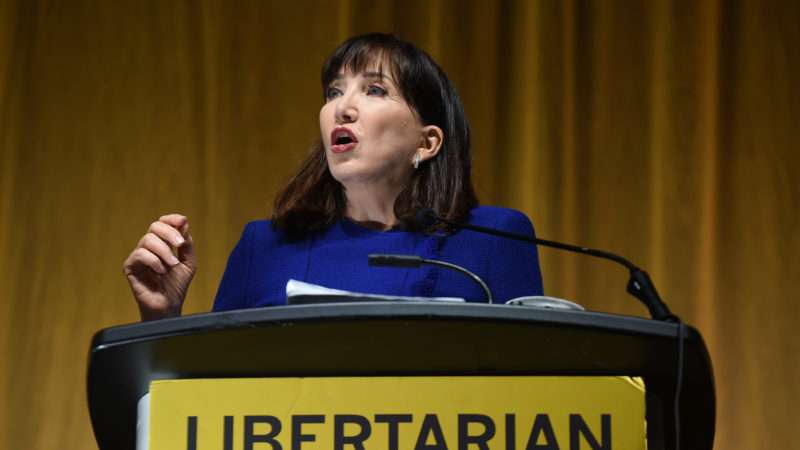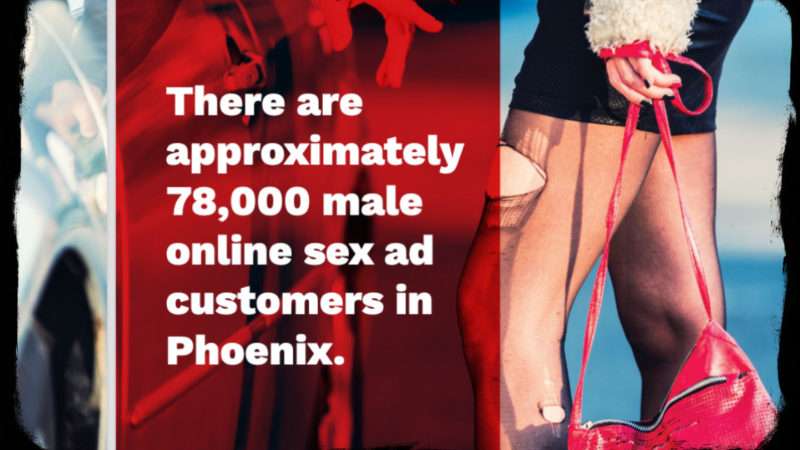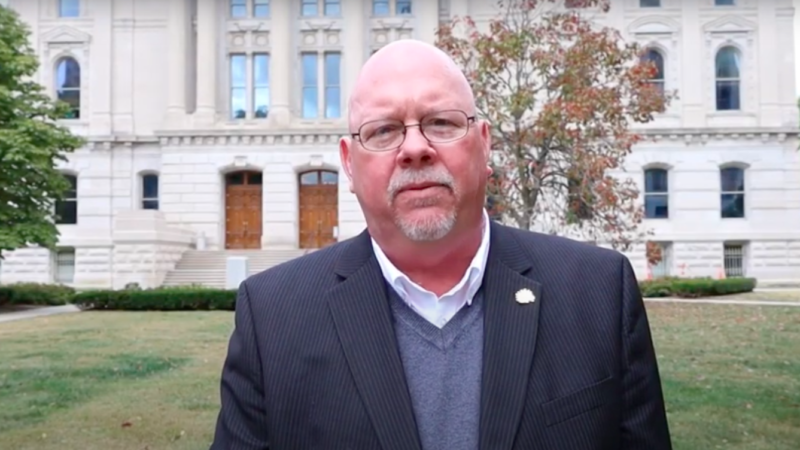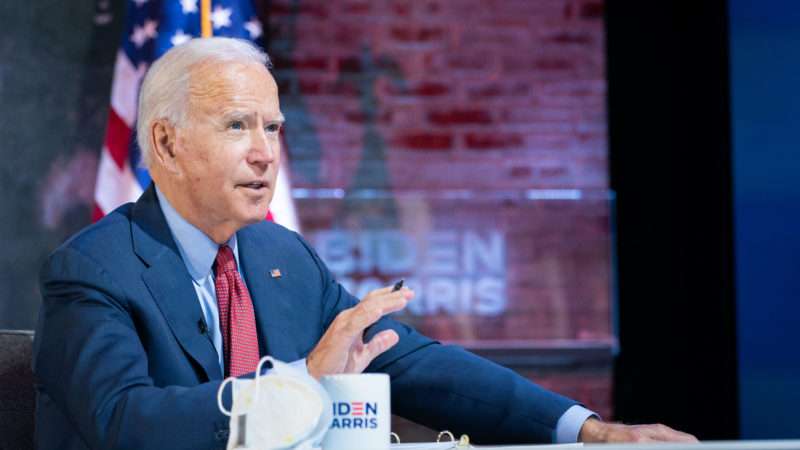As of 9 a.m. ET Friday morning, 93 hours before the first voting locations open on Election Day, polling for Libertarian Party (L.P.) presidential nominee Jo Jorgensen exceeded the distance between President Donald Trump and former Vice President Joe Biden in five critical states: Texas (with its 38 electoral votes), Ohio (18), Georgia (16), Iowa (six), and, in extremely limited polling, Alaska (three).
All five states went for Trump by at least five percentage points in 2016. Texas hasn’t voted for a Democrat since Jimmy Carter; Alaska hasn’t since Lyndon B. Johnson.
Jorgensen was also within one percentage point of the Trump-Biden margin in hotly contested Florida (29 electoral votes), North Carolina (15), and Arizona (11); each of which, too, chose Trump four years ago. (For a breakdown of the numbers, including some for Green Party nominee Howie Hawkins, scroll to the bottom of this post.)
This news may come as a surprise to those who assumed—with plenty of reason—that the incredible shrinking third-party voter wouldn’t play much if any role in the most-important-election-in-the-history-of-our-country, Flight 93 face-off between two malapropism–prone major-party septuagenarians.
And yet! Four years after the razor-thin Trump-Hillary Clinton margin was exceeded in 11 states by Libertarian Gary Johnson, four states by Green Party nominee Jill Stein, and—no, really!—one state by independent Evan McMullin, one of the 2020 election’s low-key puzzlers is that the presidential candidate from the only third party to be on all 51 ballots for three cycles running has not appeared in a single poll in nearly one-third of the country.
That means no Jorgensen polling in North Dakota, which went 6.2 percent for Johnson in 2016, the Libertarian’s second-best showing behind his home state of New Mexico. No South Dakota, either, which at 5.6 percent was his sixth-best. (Even without third-party candidates on the ballot, the Dakotas, which Trump won by 30+ points last time around, are two of his worst five states for 2016-2020 declines, at minus seventeen percentage points each.)
Trump will probably win the Dakotas, which is one of the main reasons we don’t see much third-party polling there, or in deep-red or deep-blue states such as Tennessee and Rhode Island. Political competition drives interest, for better or worse, and with the hollowing out of non-national news organizations, there just aren’t many volunteers for the job of public opinion research in Connecticut and Mississippi.
But this void may be somewhat warping our view of Tuesday’s election. When crunching Jorgensen’s numbers three weeks ago, I pointed out the absurdity of not polling nontraditional candidates in famously nonconformist Alaska, the state where the L.P. had its best showings in 1976, 1980, 1984, and 1988, and many other third-partiers have done likewise. Sure enough, the one and only poll to include the Libertarian in 2020 showed her with 8 percent (!) of the vote, compared to a six-point gap between Trump and Biden.
And as I mentioned at the beginning of the month, disincluding the marvelously named hardcore Alaskan Independence Party candidate John Wayne Howe in U.S. Senate polls in the Last Frontier was giving a distorting picture perhaps even about which major party ultimately controls the World’s (Allegedly) Greatest Deliberative Body. In three surveys since, Howe has averaged a great-for-marginal-candidates 6 percent, while FiveThirtyEight’s confidence in Republican incumbent Dan Sullivan’s reelection prospects has declined from 84 percent to 75 percent.
This all may seem like small (if delicious!) beer, and it probably is. But not necessarily to third parties, for whom polling support is not just the usual feedback mechanism for messaging impact, but also a crucial indicator of whether a state party is poised to hit typically onerous, ever-changing voting thresholds for automatic inclusion on the next season’s ballots. Are we gonna have to stand in the rain to collect signatures again next year, Ma?
Six of the top nine states in 2016 for third-party, independent, and write-in presidential candidates, ranging from Idaho‘s combined 13.2 percent vote haul to North Dakota’s 9.8 percent, have not seen a general-election poll this year with more than two names on it. Two of the remaining three states from that group, Alaska and New Mexico, have featured just a single such survey. Will Jorgensen really get 8 percent in Alaska? Probably not, but who the hell knows? Such data has not been deemed important, regardless of the one in 10 voters who in a given place and time might disagree.
As for Jorgensen, any intensity of attention paid toward her results next week will be directly proportional to the closeness of the big-ticket race. If it all comes down to Pennsylvania next Wednesday, Thursday, or beyond, the eye of Sauron will turn on Jorgensen (polling at 2.3 percent in 18 polls there this month), Hawkins (0.0 percent in four), or even Kanye West (0.3 percent in three).
But even though the eight states where Jorgensen’s totals are likeliest to exceed the Trump-Biden margin all went GOP last time, the Libertarian is less likely to face the same vitriol that greeted Green Jill Stein after 2016.
Why? Because in a world where, as former Judge Andrew Napolitano put it this week, “We have one party: the Big Government Party,” with “a Democratic wing that likes war and individual welfare and borrowing and taxes and staying in power — and a Republican wing that likes war and corporate welfare and borrowing and taxes and staying in power,” there is less expectation than ever that Libertarian voters are just weed-smoking Republicans who occasionally stray off the reservation.
In fact, polls have repeatedly shown that 2016 third-party voters—57 percent of whom pulled the lever for Johnson—disproportionately favor the Democrat in 2020. A Morning Consult poll Oct. 16–18 had 2016 third-partiers going 53 percent for Biden, 21 percent for Trump, 14 percent third party again, with 12 percent undecided. A New York Times/Siena College poll of six northern battleground states Oct. 12 showed 2016 Johnson voters going 38 percent Biden, 29 percent Jorgensen, and just 14 percent Trump.
Here are the states where Jorgensen’s percentage point polling in October exceeds or is within striking distance of what FiveThirtyEight estimates as the current Trump-Biden gap. Please keep in mind that last-day polling support for third-party and independent candidates typically overshoot their actual results by around one-third.
1) Iowa +1.5 (Biden 47.0, Trump 46.7, Jorgensen 1.8, Hawkins 0.3)
2) Ohio +1.0 (DT 47.2, JB 46.3, JJ 2.0, HH 0.7).
3) Texas +0.7 (DT 48.2, JB 46.9, JJ 2.0, HH 0.7).
4) Alaska +0.5 (DT 50.9, JB 43.4, JJ 8.0).
5) Georgia +0.3 (JB 48.4, DT 46.8, JJ 1.9, HH 0.7).
6) North Carolina -0.4 (JB 48.9, DT 47.0, JJ 1.5, Don Blankenship 0.5, Kanye West 0.0).
7) Arizona -0.6 (JB 48.7, DT 45.6, JJ 2.5, HH 0.3, KW 0.3).
8) Florida -0.7 (JB 48.6, DT 46.6, JJ 1.3, HH 0.7).

from Latest – Reason.com https://ift.tt/3kDAoXT
via IFTTT



